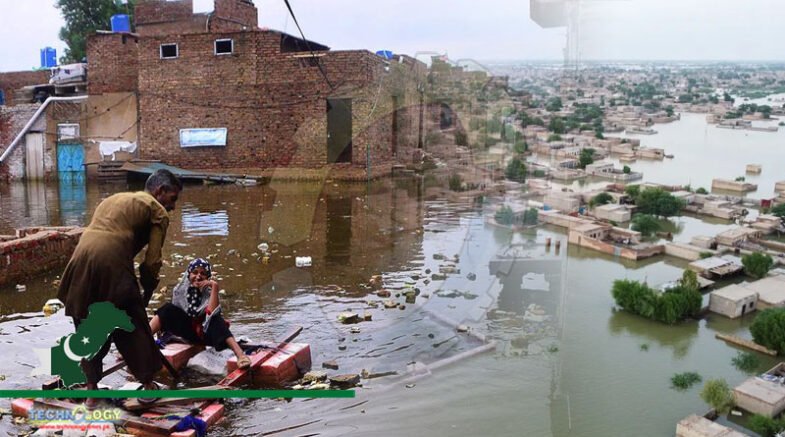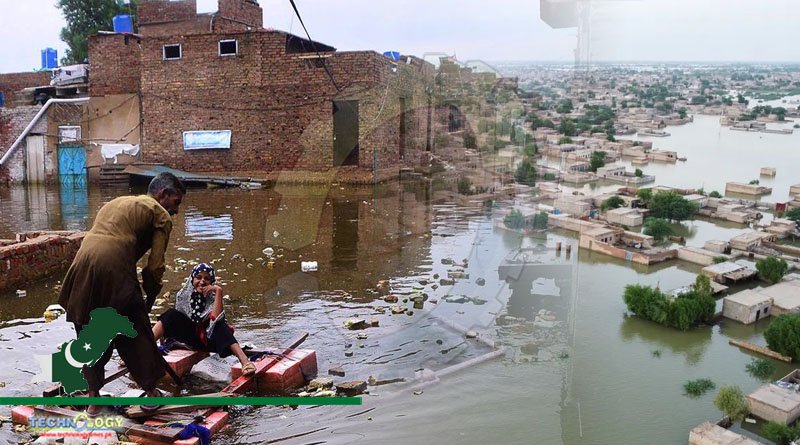Pakistan has experienced 173 climate-related disasters in the past two decades (2000-2019) with estimated losses of $3,772 billion, according to a German Watch report. As losses related to rapidly increasing, Pakistan’s demand for climate justice is quite realistic.

Pakistan has experienced 173 climate-related disasters in the past two decades (2000-2019) with estimated losses of $3,772 billion, according to a German Watch report. These events included floods, heatwaves, unprecedented rainfall, forced environmental migration, glacier melting and glacial lake outburst floods. This is the result of a 0.5°C increase in the annual mean temperature in Pakistan over the past 50 years. As losses related to rapidly increasing, Pakistan’s demand for climate justice is quite realistic.
It has also resulted in an increase in heatwave days per year: a fivefold increase in the last 30 years. Sea level along the Karachi coast has risen approximately 10 centimetres in the last century. The annual precipitation has shown high variability but has slightly increased over the last 50 years. The most recent evidence of increased precipitation was witnessed this year as 88 districts were badly impacted, forcing millions to leave their homes. According to the latest estimates by the World Bank, the damage is estimated to exceed $14.9 billion and economic losses to reach about $15.2 billion. As losses related to rapidly increasing, Pakistan’s demand for climate justice is quite realistic.
As a vice chairman, Prime Minister Shahbaz Sharif will be talking about the vulnerability of Pakistan and the developing world at the forthcoming Conference of Parties (COP27).
The COP is a great opportunity to present our case in terms of the most affected country due to climate change and the losses attributed to it. The major thematic areas where Pakistan needs to argue its case are climate adaptation, industry decarbonisation, water, food and nature.
Despite having contributed little to global emissions, Pakistan is at the forefront of climate change impacts. Recent floods have impacted 33 million people. More than 1,700 people have died in this year’s flood alone. According to the World Bank, loss in gross domestic product (GDP) as a direct impact of the floods is projected to be around 2.2 percent of FY22 GDP, pushing 8.4-9.1 million people below the poverty line. People have lost their homes, livestock and livelihood sources. There is a continued threat of waterborne diseases on account of the stagnant water. The rehabilitation cost for the 33 million population, according to the World Bank estimates, is at least $16.3 billion.
Pakistan needs to emphasise the need for adaptation and remind the rich nations of their commitment under Article 8 of the Paris Agreement i.e., provision of funds for adaptation. The Pakistani delegation should press for a “loss and damage” facility and call for a mechanism to be put in place so that developing countries, including Pakistan, can be compensated. Pakistan is demanding climate justice from the world’s richest industrialized countries. Pakistan needs this compensation money for early warning systems, climate resilient infrastructure and nature-based solutions. This is also a great opportunity for building partnerships between governments, private sector and investors for climate adaptation.
If we look at the COP27 agenda, several sessions are dedicated to Africa. There is no session focusing on Pakistan. While Africa is among the most vulnerable to climate change, so is Pakistan.
Another important area is industry decarbonisation. Pakistan, along with G77 plus China, should push rich countries to cut industrial emissions. For this, they need to phase out fossil fuels as global warming is impacting every region of the world. The Pakistani delegation should persuade the world it needs clean technology transfer and capacity building to phase out coal. For shifting to renewables, Pakistan needs funds and capacity that rich nations should provide in terms of climate justice. The provincial governments too should devise plans for climate resilient infrastructures and planning for expansion of cities.
Many developing countries, including Pakistan, have water related issues. Water security is a key priority issue of COP27 presidency. Pakistan is currently experiencing massive floods, droughts and glacier melting. The COP27 is to be followed by the UN 2023 Water Conference in March. This is a great platform to highlight how safe water scarcity is affecting the health of many in Pakistan (particularly during the floods, women and children had no choice but to drink contaminated flood water, leading to waterborne diseases and skin issues). The recent floods have caused serious sanitation issues in flood-hit areas.
COP27 will also discuss food (in)security and how food demand can be met in a climate resilient way through innovative solutions. During the recent floods, major livestock and agriculture losses worth $3.7 billion were incurred. People lost their cash crops, vegetables fields and fruit orchards. This has had a major impact on children and pregnant women. Experts fear that this may lead to stunted growth in children, especially in several areas of Sindh.
The floods have had a visible impact on inflation. Pakistan should also bring up mental health issues of the flood-affected people to demand climate justice. Our delegation should hold talks with donors and find partners to facilitate capacity building, research and resources to help affected people secure their livelihood. Our farmers need innovative solutions for growing their crops and fruits.
Land cover is depleting at an alarming rate globally due to deforestation and unplanned construction of cities. Nature has a great potential as a carbon sink. Pakistan has already undertaken a large-scale plantation drive but more efforts are needed in terms of increasing mangrove cover and sustainable use of land for agriculture purposes. At the Nature Pavilion, Pakistan should look for investors and collaboration. Developed nations should also seriously commit to increasing forest cover.
This year the COP is providing an opportunity to young people to speak at the conference and be a part of the solution. Young activists from Pakistan too should raise their voices. A lot of sessions in the COP27 agenda are dedicated to Africa but there is no session focusing on Pakistan. While Africa is among the most vulnerable regions in terms of climate change, so is Pakistan. Our delegation, civil society and media should work together to raise a voice against the climate injustice the country and its people are facing.
Originally published at The News
